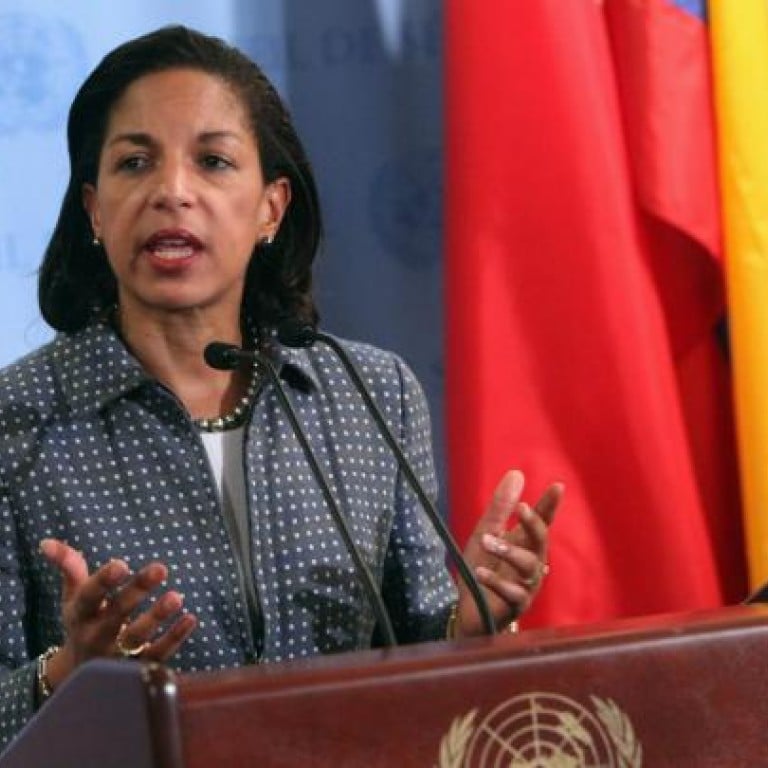
Trial by fire for Obama's choice to succeed Clinton
Row over UN ambassador raises questions about her suitability as the next state secretary
Susan Rice was playing stand-in on September 16 when she appeared on five Sunday news programmes a few days after the deadly attack in Benghazi, Libya, that killed four Americans.
Secretary of State Hillary Rodham Clinton would have been the White House's logical choice to discuss the chaotic events in the Middle East, but she was drained after a harrowing week, officials said. Even if she had not been consoling the families of those who died, including Ambassador Christopher Stevens, Clinton typically steers clear of the Sunday shows.
So instead, Rice, the ambassador to the UN, delivered her now-infamous account of the episode. Reciting talking points supplied by intelligence agencies, she said that the Benghazi siege appeared to have been a spontaneous protest later hijacked by extremists, not a premeditated terrorist attack. Within days, Republicans were calling for her head.
In her sure-footed ascent of the foreign-policy ladder, Rice has rarely shrunk from a fight. But now that she appears poised to claim the top rung - White House aides say she is President Barack Obama's favoured candidate for secretary of state - this sharp-tongued, self-confident diplomat finds herself in a bitter feud in which she is largely a bystander.
"Susan had a reputation, fairly or not, as someone who could run a little hot and shoot from the hip," said John Norris, a foreign-policy expert at the Centre for American Progress. "If someone had told me that the biggest knock on her was going to be that she too slavishly followed the talking points on Benghazi, I would have been shocked."
At the UN, and in posts in the Clinton White House, Rice, who turned 48 on Saturday, has earned a reputation as a blunt advocate, relentless on issues like intervening in Libya to prevent a slaughter by Muammar Gaddafi.
She was a Rhodes scholar, has degrees from Stanford and Oxford, a list of contacts and a relationship with Obama sealed during his 2008 campaign. So her ascension to lead the State Department would be less a blow for diversity - she would be the second black woman named Rice to hold the job - than the natural capstone to a fast-track career.
Yet the firestorm over Benghazi raises questions: is Rice the best candidate to succeed Clinton as the nation's chief diplomat? Does she have the diplomatic finesse to handle thorny problems in the Middle East? And even if Obama gets the votes for her confirmation, has the episode so tainted her that it would be hard for her to do the job?
Rice's supporters say she has compiled a solid record at the UN, winning the passage of resolutions that impose strict sanctions on Iran and North Korea. Diplomats praise her energetic negotiating style, though her peremptory manner has bruised some egos. But even those who back her tend to emphasise factors like her ties to Obama, an advantage that Clinton, for all her celebrity, did not have.
"Given that he's probably the most withholding president on foreign policy since Nixon, if anyone can get him to delegate, not dominate, it's Rice," said Aaron David Miller, a longtime Middle East negotiator now at the Woodrow Wilson Centre. "That would be good for her, and for our foreign policy."
While some in the State Department are wary of her, recalling her blustery style as assistant secretary for African affairs in the Clinton administration, Rice has a core of support among Obama's aides, who insist that Benghazi will not derail her chances. Some analysts said Obama's defence of her last week was so impassioned that he had left himself little room to put forward an alternative, like Senator John Kerry.
"The attacks are patently unfair and mean-spirited," said Tommy Vietor, a spokesman for the National Security Council. "Susan's record at the UN is exceptional."
Rice has had little use for the bland artifice of diplomatic language. When Russia and China blocked a resolution condemning the crackdown in Syria, she wrote on Twitter, "Disgusted that Russia and China prevented the UN Security Council from fulfilling its sole purpose."
By her own account, Rice's fervour is fuelled by the Clinton administration's inaction in Rwanda. Years later, she told Samantha Power, then a journalist writing about the episode, that "I swore to myself that if I ever faced such a crisis again, I would come down on the side of dramatic action, going down in flames if that was required."
